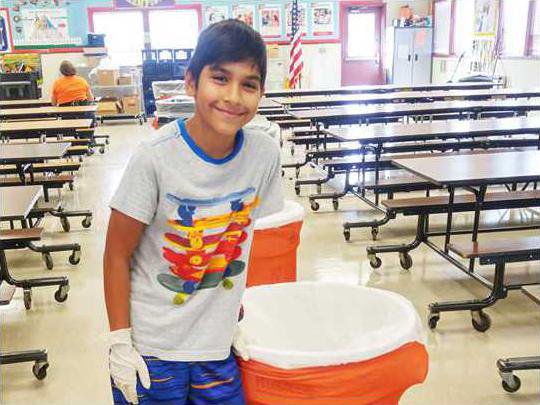Those banana peels, left over pizza slices, and produce that’s gone bad add up.
In any given year Manteca tosses out 3,410 tons of food waste or 88.57 pounds per capita.
On Tuesday, the Manteca City Council will take another step toward making sure the food we toss doesn’t go to waste while at the same time helping clean our air.
They will be asked to accept a matching grant of $3 million from the California Energy Commission for the $19.8 million food to fuel project that involves producing compressed biogas from the 3,410 tons of food waste and 290 tons of fat, oil and grease known by the acronym FOG that Manteca throws out each year combined with the methane gas byproduct of the wastewater treatment plant process.
When completed as early as late 2018, the city will be able to fuel at least two dozen solid waste trucks from a filling facility being built at the wastewater treatment plant. They could have excess capacity that might be available for sale to the public that use vehicles powered by natural gas. There is also a possibility they could barter recyclables with nearby cities in exchange for their food waste to generate more biogas once everything is up and running.
The project by the city does a number of things. It is allowing Manteca to make needed treatment plant improvements do double duty, save money down the road, avoid costly state fines, help reduce pollution, and even extend the life of solid waste trucks that cost from $250,000 apiece for roll-off trucks that collect large open dumpsters and $360,000 for front loaders used on commercial routes to $400,000 for side orders used primarily on residential routes.
Manteca, like all other California jurisdiction is under a state mandate to reduce and eventually stop burying food waste in landfills. All elementary schools in Manteca as well as many commercial generators of food waste — supermarkets and restaurants — are already using orange carts for food waste. Part of what is now being collected is being converted to compost while the rest is being buried. It is practical only to combine a small amount of food waste with green waste to make compost. The goal is to have the collection system working efficiently so when the biogas production facility comes on line there are no hitches.
The city is one of the few in the state to employ such an approach to its food waste. That’s because Manteca still retains control of their own municipal solid waste collection system.
Over half of the $19.8 million project includes $10.5 million worth of work that had to be done anyway at the treatment plant to replace aging digesters and build a new digester control building. By doing it in tandem with the food to fuel program small modifications can be done to make the system work. Money for that has already been set aside in the wastewater treatment enterprise accounts and sewer fees form growth.
The FOG receiving facilities will cost $1.3 million and is being funded from sewer accounts. Currently FOG is shipped to a private firm in Oakland at a significant cost to the city.
The compressed biogas fueling facilities will cost $6 million and will come from reserves set aside for capital improvements in the sewer maintenance and operation fund. The state grant will offset 50 percent of that grant.
The food waste receiving facility going in at the Lovelace Transfer station is costing the solid waste account $545,000.
The solid waste fees put in place this year accounted for that cost as well as making up for the failure over 11 years to readjust the fee for inflation.
By using methane gas in the process, the city will be able to stop burning off that byproduct of the wastewater treatment process to reduce air pollution. That’s in exchange from switching from diesel to clean burning biogas for the city’s solid waste trucks.
To contact Dennis Wyatt, email dwyatt@mantecabulletin.com.
FOOD WASTE: WE TOSS 3,410 TONS ANNUALLY
Mantecas waste will power garbage trucks





